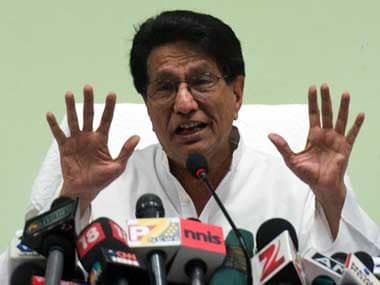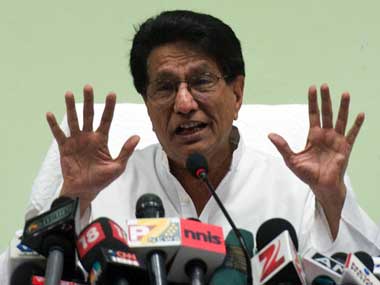When you look at Chaudhary Ajit Singh’s CV, it makes you wonder how he made a complete mess of his life. Was he confused? Over ambitious? Impatient? Rank opportunist? Addicted to power? Or did his father’s heritage both build and destroy him? [caption id=“attachment_1720055” align=“alignleft” width=“380”]
 Former Union minister Ajit Singh.[/caption] Watching him scrap with the Centre for a bungalow in Delhi and turn his personal exigency into a battle for his father’s legacy highlights how Singh threw away a fortunate career with both hands for simple, petty, short-term gains and divested himself completely of ideological credibility. It shows even after several high-profile degrees, three decades in politics, after numerous opportunities, alliances, ministerial jobs; Ajit Singh has remained his papa’s boy. He has simply refused to grow out of his father’s shadow. What exactly is Ajit Singh’s current problem? He doesn’t want to vacate the bungalow allotted to him as a minister in UPA-2. Apart from Jitendra Singh, he is the only one who has not moved out of government accommodation. He is protesting the eviction order by claiming that the bungalow be turned into a memorial for his father-the rustic leader Indira Gandhi used as a tool for pulling down Morarji Desai’s government. His life seems to have come full circle. When he had entered politics, Ajit Singh had invoked the legacy of his father. An IIT-graduate armed with a degree from the Illionois Institute of Technology, Ajit Singh’s only introduction to voters in western Uttar Pradesh, in areas around family fiefdom Baghpat, was his famous father. Now that he is floundering, his career is on the deathbed, he is invoking his father’s spirit again. His efforts to arm-twist the government on the pretext of preserving his father’s heritage is nothing but a desperate attempt to keep himself relevant in the politics of western UP after the severe drubbing in the recent Lok Sabha polls. Ajit Singh is not fighting for his father’s past. He is battling for his own future. For three decades, Ajit Singh kept himself alive in politics simply because an alliance with him was perceived to be beneficial for his partner in Delhi. Singh had a small pocket of influence in the Jat belt of UP and his supporters transferred their vote to the party he partnered. Singh made the most of this opportunity. He swung in all directions, allied with parties of all hues, colours, ideologies and faiths. He kept his philosophy simple: I want to be a minister. So, Singh was a minister in the VP Singh government, after that in the PV Narasimha Rao government; Atal Behari Vajpayee also inducted him in his cabinet and Manmohan Singh too had an important portfolio for him. Since 1990, India has had three types of government: Congress, BJP and Janata Dal. Singh is the only politician around to have been part of all of them. All these years he survived and thrived because of coalition politics. Now that he is not needed any more, Singh is out on the streets. That the Haryana chief minister is keen to support him-evidently for impressing Jat voters, who, Bhupinder Singh Hooda feels, would be moved by the memory of Chaudhary Charan Singh-shows why Ajit Singh’s brand of politics flourishes intermittently. Somebody always finds him useful for short-term gains because he happens to be a custodian of his late father’s political equity. Once the goal is achieved, either he is dumped or Ajit Singh breaks away to partner with the party that is likely to form the next government. His father, to use a clichéd line, would be turning in his grave. In 1987, when he died, Charan Singh may have left the mortal world convinced that his son would carry his legacy forward. Only he would understand the pain of being exhumed again and again for keeping his 75-year-old boy career alive.
Former Union minister Ajit Singh.[/caption] Watching him scrap with the Centre for a bungalow in Delhi and turn his personal exigency into a battle for his father’s legacy highlights how Singh threw away a fortunate career with both hands for simple, petty, short-term gains and divested himself completely of ideological credibility. It shows even after several high-profile degrees, three decades in politics, after numerous opportunities, alliances, ministerial jobs; Ajit Singh has remained his papa’s boy. He has simply refused to grow out of his father’s shadow. What exactly is Ajit Singh’s current problem? He doesn’t want to vacate the bungalow allotted to him as a minister in UPA-2. Apart from Jitendra Singh, he is the only one who has not moved out of government accommodation. He is protesting the eviction order by claiming that the bungalow be turned into a memorial for his father-the rustic leader Indira Gandhi used as a tool for pulling down Morarji Desai’s government. His life seems to have come full circle. When he had entered politics, Ajit Singh had invoked the legacy of his father. An IIT-graduate armed with a degree from the Illionois Institute of Technology, Ajit Singh’s only introduction to voters in western Uttar Pradesh, in areas around family fiefdom Baghpat, was his famous father. Now that he is floundering, his career is on the deathbed, he is invoking his father’s spirit again. His efforts to arm-twist the government on the pretext of preserving his father’s heritage is nothing but a desperate attempt to keep himself relevant in the politics of western UP after the severe drubbing in the recent Lok Sabha polls. Ajit Singh is not fighting for his father’s past. He is battling for his own future. For three decades, Ajit Singh kept himself alive in politics simply because an alliance with him was perceived to be beneficial for his partner in Delhi. Singh had a small pocket of influence in the Jat belt of UP and his supporters transferred their vote to the party he partnered. Singh made the most of this opportunity. He swung in all directions, allied with parties of all hues, colours, ideologies and faiths. He kept his philosophy simple: I want to be a minister. So, Singh was a minister in the VP Singh government, after that in the PV Narasimha Rao government; Atal Behari Vajpayee also inducted him in his cabinet and Manmohan Singh too had an important portfolio for him. Since 1990, India has had three types of government: Congress, BJP and Janata Dal. Singh is the only politician around to have been part of all of them. All these years he survived and thrived because of coalition politics. Now that he is not needed any more, Singh is out on the streets. That the Haryana chief minister is keen to support him-evidently for impressing Jat voters, who, Bhupinder Singh Hooda feels, would be moved by the memory of Chaudhary Charan Singh-shows why Ajit Singh’s brand of politics flourishes intermittently. Somebody always finds him useful for short-term gains because he happens to be a custodian of his late father’s political equity. Once the goal is achieved, either he is dumped or Ajit Singh breaks away to partner with the party that is likely to form the next government. His father, to use a clichéd line, would be turning in his grave. In 1987, when he died, Charan Singh may have left the mortal world convinced that his son would carry his legacy forward. Only he would understand the pain of being exhumed again and again for keeping his 75-year-old boy career alive.
Mere baap ka hai: Ajit Singh’s wagers father’s legacy for Lutyens bungalow
FP Politics
• September 19, 2014, 12:56:40 IST
What exactly is Ajit Singh ’s current problem? He doesn’t want to vacate the bungalow allotted to him as a minister in UPA-2. Apart from Jitendra Singh, he is the only one who has not moved out of government accommodation.
Advertisement
)
End of Article